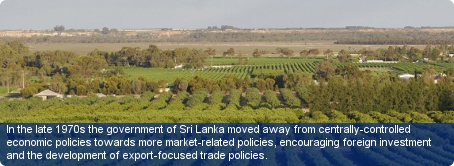Find a business in Sri Lanka

The island state of Sri Lanka has grown strongly after the cessation of civil strife in May 2009, yielding rates of 8% in both 2010 and 2011. Sri Lanka has a GNI per capita of US$2,920 (2012) and has seen GDP growth of 6.4% per annum (2008-12). The industry sector has continued to grow steadily, partly because of the necessary reconstruction following the massive tsunami of December 2004. However, the agriculture sector still remains an important part of the economy, especially to the rural poor.
Sri Lanka’s year round moderate climate, fertile soil and biannual monsoon rains create ideal conditions for agriculture. As a result, the agricultural sector has always performed as a major economic force in Sri Lanka, making a significant contribution to the national economy, food security and employment. At the same time agriculture is the livelihood of the majority of the country’s rural population and plays a key role in alleviating rural poverty. In 2010 this sector contributed 14% of Sri Lanka’s GDP. The country’s main agricultural products include tea, sugarcane, spices and rubber.
The financial services sub sector is a key part of Sri Lanka’s economy where the services sector contributes 56% of GDP (2010). The financial sector has also been one of the fastest growing segments of the economy. Services offered by the sector include commercial banking, insurance, pensions and provident funds, investment banking and many financial intermediary functions. The sector is dominated by a modern banking system that accounted for 54% of the financial sector’s assets in 2009. The system consists of over 30 banks, the majority of which are licensed commercial banks with the remainder being licensed specialised banks. As of 2012, government-owned banks accounted for about 50% of the market.
Manufacturing contributes approximately 20% of Sri Lanka’s GDP. Industrial products produced by the Island include textiles, processed rubber, cement, refined petroleum, clothing and various agricultural commodities. The textile and clothing industry is Sri Lanka’s largest manufacturing sub sector and is the country’s single largest employer, directly and indirectly providing almost 75% of jobs in the country. Sri Lanka is also famous for its export of Ceylon tea and the tea industry employs over one million personnel.
In December 2004, a major tsunami struck parts of the island causing 31,000 fatalities. The tsunami left more than 6,300 people missing and 443,000 displaced, and destroyed an estimated US$1.5 billion worth of property. Five years later, the 2008-09 global financial crisis and recession almost caused a balance of payments crisis in Sri Lanka with growth slowing to 3.5% in 2009. But economic activity rebounded strongly with the end of the war and an IMF agreement, resulting in two straight years of high growth in 2010 and 2011.
National roads carry over 70% of Sri Lanka’s traffic and are vital for the movement of goods and people. Roads are often the only way for the majority of the rural population to gain access to essential services such as schools and hospitals. There are more than 97,290 km of road, 81% of which are paved.
Sri Lanka is ranked 38th out of 183 countries in the world for starting a business, according to the World Bank’s ‘Doing Business 2012’ study. Overall, for the ease of doing business it is placed 89th rank. These rankings measure the conduciveness of a regulatory regime in starting and operating a business.
The adult literacy rate is 91.2% (2010) and the majority of the population speaks Sinhalese, but Tamil and English are also widely spoken, and English is used in commerce and government. A 2009 labour force survey showed a labour force participation rate of 48.7%. The survey identified over 40% of the total employed population to be working in the services sector, 25% in the industrial sector with the remainder being employed in the agricultural sector. The survey also classified approximately 14% of the total labour force as professionals, managers and senior officials.



